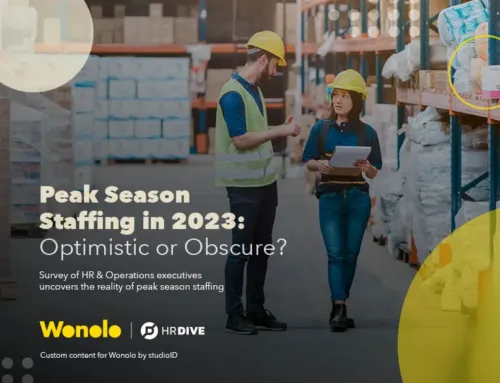Wonolo
Earning income as a full-time freelancer has its pros and cons. The pros include work-life balance, greater control over income, and being able to set your own schedule. One of the only cons of full-time freelancing is managing budget; as projects come and go, your income increases and decreases, making it hard to plan ahead and sometimes even save.
That doesn’t mean it’s not possible. Quite the contrary, as a full-time, self-employed freelancer and contractor myself, I know that managing budget, saving each month, and predicting what you’ll make month to month is do-able. If you feel frustrated with money management, use these tips to get your finances in order and live with greater peace of mind.
Get Organized
Getting organized is the name of the game for freelancers, especially when juggling multiple clients and projects. With a variety of income streams, it’s harder to know how much you’re making, where it’s coming from and how much you can plan to make next month.
Here are my top tips for taking the first step toward improved financial management: getting your money organized.
Track month-to-month: Start by tracking every project and gig you take on. You can see in the screenshot of my personal financial tracking sheet below how I track every piece of client work, including due date, payment type (check vs. direct deposit, etc.), when the invoice was sent and more. I keep a running tally of how much I make each month so it’s easier to estimate what I can expect the following month.
![]()
The key is keeping your tracking sheet updated. As soon as a project comes in for the next month, add it to your doc. At any time you can glance over and know what to expect from the current and following month.
Note that if you want to buy a home or take out a loan, you may need to have this information at the ready (I had to create my own profit/loss statement recently), and if you haven’t been tracking, it will be much harder to gather and organize.
Know the Tax Dates: Part of getting organized is knowing when you owe taxes throughout the year. As a freelance or contract employee, you need to pay quarterly, rather than just in April. If you miss the due date you’ll be fined and may have to pay interest on the unpaid balance. Get more information at the IRS website.
Get the 2017/2018 tax dates and add them to your calendar to avoid costly penalties.
Find the Right Tools
Need to track spending? There’s an app for that. Need to send invoices? There’s an app for that. The right set of tools will help you set and stick with financial goals, track what’s coming out, and much more. Here are a few tools to keep in mind as you build out your freelance income toolbox.
Simple Budget Calculator: Use this tool to get a baseline number for how much you’re saving or going over budget each month. The only numbers you need are money in and money out. You’ll get a total number, which represents or your income or debt, along with what percentage that is of your income coming in. Use this on a monthly, quarterly or annual basis to get a baseline number for setting income goals.
Wave: This accounting software is free—and the creators are very clear about that on their website: “Wave’s software is 100% free. Let’s not overcomplicate this. When we say free, we mean it. No set-up fees, no hidden charges. Not a free trial. Not a free limited version. Free means free.”
Note that you do pay fees for credit card and bank processing, but it still works well as a free tool, allowing you to manually track income and expenses or connect your bank account to automate it.
Top Tracker: Created by Toptal, use this free time tracking app to make sure you’re not going above and beyond the scope of your projects. It’s easy to get lost in something, but if you’re not getting paid for the extra work, it ends up costing you.
In addition, I use a variety of Google Suite tools to manage my freelance finances, including Google Sheets, a Google sheets invoice template and their notebook, Google Keep. All of these are free and easy to use, making them a good place to start.
Set Goals
To make money management easier as a freelancer, don’t just accept what’s coming in. This leads to a regular influx of stress: Will I make enough this month? Will I be able to pay rent?
Instead, set goals that encourage you to seek out more work or save more of your income each month. Here are a few goals to consider as you plan your own:
- Make $X more in January than I did last January
- Earn a monthly income, before taxes, of at least $X
- Save $X each month, and put away $X for taxes and $X for my 401K
- Increase pricing every X months over the next X years
Push for Long-Term Work
Agencies and large businesses don’t take clients on a month-to-month basis. Why? Because it’s unstable and allows the client or customer to be noncommittal about your work for them. While you may accept this work when first getting started, consider making money management easier—and get and keep more consistent work—by using long-term contracts when signing with a new client.
Here are a few tips to get started with this pricing and fee format:
- Create a media kit and pricing structure, if you don’t already have one. This makes it easy for you to quote clients quickly and accurately, and ensures you’re getting paid enough on each project.
- Consider discounting the price if they agree to a 3-, 6- or 12-month contract.
- Include a 30-day cancellation clause, allowing the client to cancel the contract if they give you 30-days notice. This is helpful for them and you—they can back out if they need to, and the 30 days gives you enough time to find new work if needed.
Find Financial Peace of Mind
Managing budget as a freelancer can be stressful, with unsteady income and client consistency sometimes out of your control. Use these tips and tools to predict what you’ll be making, set yourself up for long-term savings and retirement, and be clear on how much you’re making rather than spending. Not only will having this knowledge give you greater peace of mind, but it will also allow you to set a strong financial foundation for your future.


![[Report] Beyond the Gig: Exploring Reliable Work Options for the Modern Workforce](https://info.wonolo.com/wp-content/uploads/2023/10/Worker-Preferences-Report-Header-Image-500x383.png)



